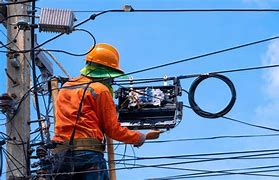EV Charger Installation: How to Choose the Right Charger for Your Home or Business

Strong 8k brings an ultra-HD IPTV experience to your living room and your pocket.
The adoption of electric vehicles (EVs) is rising rapidly, making EV chargers an essential investment for homeowners and businesses. Whether you're looking to install a charger for personal use or to attract customers and employees, selecting the right EV charger requires careful consideration. This guide will walk you through key factors to consider, charger types, installation requirements, and cost estimates to help you make an informed decision.
1. Understanding EV Charger Types
EV chargers are categorized into three levels based on their power output and charging speed.
Level 1 Chargers
• Power Output: 120V AC, typically 1.3–2.4 kW
• Charging Speed: Adds 3-5 miles of range per hour
• Best For: Homeowners with limited charging needs and overnight charging
• Installation: Uses a standard household outlet, requiring no special setup
Level 2 Chargers
• Power Output: 240V AC, 3.3–19.2 kW
• Charging Speed: Adds 12-60 miles of range per hour
• Best For: Homeowners wanting faster charging and businesses catering to customers and employees
• Installation: Requires a dedicated 240V circuit installed by a licensed electrician
DC Fast Chargers (Level 3)
• Power Output: 50 kW and above
• Charging Speed: Adds 100+ miles of range in 20-30 minutes
• Best For: Commercial locations, public charging stations, and fleet operations
• Installation: Requires high-voltage electrical supply and significant infrastructure investment
2. Key Considerations for Choosing an EV Charger
1. Charging Speed Needs
Evaluate your daily driving habits. If you drive short distances, a Level 1 charger may suffice. However, for frequent long trips or business use, a Level 2 or DC fast charger is ideal.
2. Vehicle Compatibility
Not all EVs support fast charging. Check your vehicle’s maximum charging capacity to ensure compatibility with the chosen charger.
3. Installation Costs and Requirements
Level 1 chargers require no installation, while Level 2 and DC fast chargers demand electrical work. Installation costs vary based on wiring, panel upgrades, and labor.
4. Smart Features
Modern chargers offer smart features like Wi-Fi connectivity, mobile app integration, scheduled charging, and energy monitoring. Businesses may benefit from networked chargers that support user authentication and billing.
5. Safety and Certification
Choose chargers certified by organizations such as UL (Underwriters Laboratories) or ENERGY STAR to ensure safety and efficiency.
6. Rebates and Incentives
Government incentives can reduce installation costs. Check local and federal programs for potential rebates. According to the U.S. Department of Energy, EV charging incentives can cover up to 30% of installation costs Source.
3. Installation Process and Requirements
For Homeowners
1. Electrical Assessment: Hire a certified electrician to evaluate your home's electrical capacity.
2. Choosing the Right Location: Preferably near the parking spot, with easy access to power.
3. Installing a Dedicated Circuit: Level 2 chargers require a dedicated 240V circuit.
4. Permits and Inspections: Some localities require permits and inspections to ensure compliance with safety codes.
5. Mounting and Testing: Once installed, the charger should be tested to verify functionality.
For Businesses
1. Site Assessment: Evaluate available space, power capacity, and customer demand.
2. Infrastructure Upgrades: Upgrading electrical panels or transformers may be necessary.
3. Charger Selection: Choose between standalone, networked, or pay-per-use chargers.
4. Installation and Compliance: Work with licensed professionals to ensure regulatory compliance.
5. Signage and Accessibility: Install clear signage and comply with ADA requirements if needed.
6. Ongoing Maintenance: Implement a maintenance plan to ensure uptime and performance.
4. Cost Analysis: Home vs. Business Installation
Home Installation Costs
• Level 1 Charger: $0 (uses a standard outlet)
• Level 2 Charger: $500–$700 for the unit, plus $500–$2,000 for installation
Business Installation Costs
• Level 2 Charger: $1,000–$5,000 per unit, plus installation costs ($2,000–$10,000)
• DC Fast Charger: $10,000–$50,000 per unit, plus installation costs ($20,000–$100,000)
According to the International Energy Agency (IEA), the number of public EV charging stations worldwide grew by 40% in 2022, reflecting increasing demand for commercial charging solutions Source.
5. Conclusion: Making the Right Choice
For homeowners, a Level 2 charger offers the best balance of speed and cost. For businesses, investing in multiple Level 2 chargers or DC fast chargers can attract customers and future-proof operations. By assessing your needs, installation requirements, and available incentives, you can choose the right EV charger that enhances convenience and sustainability.
Note: IndiBlogHub features both user-submitted and editorial content. We do not verify third-party contributions. Read our Disclaimer and Privacy Policyfor details.







